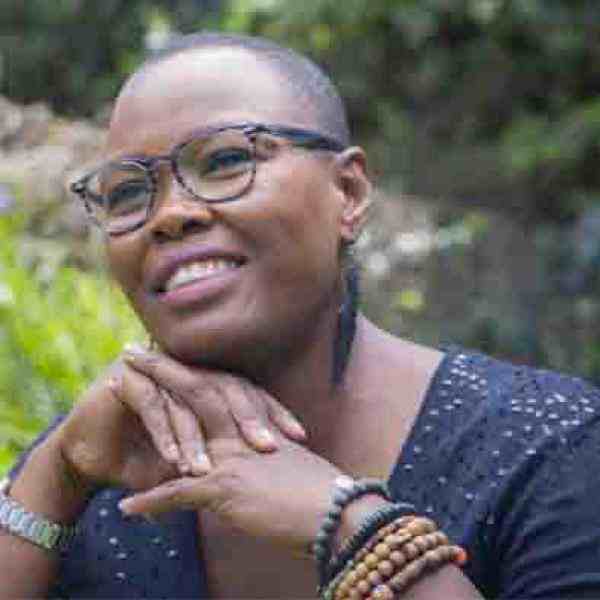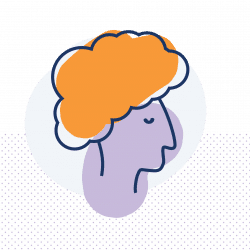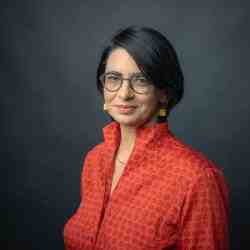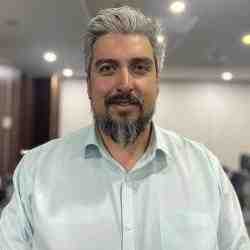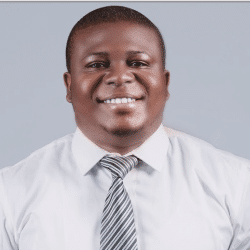Introduction
In a country where the persistence of lingering stigma about persons with disabilities impacts far too many, their rights are still a long way from where they should be. Lizzie dedicated the past decade to understanding the negativity around the term “disable” and after years of exploration, she finally found the specific intersection where she could bring significant change in the world. Lizzie is amplifying the voices, building capacity, and creating visibility for women and girls with disabilities across Kenya and beyond.
The New Idea
The Kenyan society needs to unlearn the negative connotations on the term ‘disabilities.’ For this to happen, Lizzie understands that media plays a crucial role to create public awareness and ultimately in re-educating the masses. She is amplifying voices, building capacity, and creating visibility for women and girls with disabilities across Kenya and beyond. This includes leading conversations with the private sector on disability inclusion in the workplace and exploring the role of advertising and marketing in realizing the enjoyment of rights for women and girls with disabilities.
This Ability Trust envisions a society in which women and girls with disabilities are respected and upheld, allowing them to live fully integrated lives politically, economically, and socially. Lizzie is advancing their rights while increasing their visibility through the lens of sexual reproductive health and economic empowerment. She does this by providing them with information and making them the protagonists in conversations around these topics while using technology for data-rich, evidence-based policy advocacy. As opposed to most approaches in fields, Lizzie specifically targets women and girls. She believes that empowering them economically and financially will enable them to claim other subsequent rights like sexual and reproductive health.
Lizzie aims to have full representation in all 47 counties of Kenya and dreams of having representation across the African continent. As a leader, Lizzie has been successful in her ability to take calculated risks in a constantly changing world whilst staying true to her vision.
The Problem
In East Africa, the term ‘disability’ is mostly associated with negativity, poverty, and fear. Society has internalized this perception and stigma leading to lower standards for persons with disabilities, disregarding them as human beings with their own identity. Such neglection is often manifested in superficial solutions that fit just the bare minimum (or even less) to “tick a box.” This mindset has been passed down from generation to generation.
Leadership also plays an important role in the problem. The smallest community-based organization to the highest government ranks are integrated by individuals who were brought up with the same set of beliefs. Consequently, there is little motivation to change this narrative. Although there are 4.4 million Kenyans living with disabilities, this doesn’t seem big enough to make them visible through policies, programming, or budgeting.
Additionally, Kenyan society still portrays the medical model where someone with a disability is seen as “ill,” therefore they need to stay at home until they are “cured.” This model deepens the issue by focusing on the impairment instead of looking at the disability as a full identity. On the other hand, the charity model perceives people with disabilities as individuals who cannot stand up for themselves and need constant help. In most cases, the support given by charities, NGOs, and Government, is not done in a way that empowers such individuals. Media contributes to building such perception by disseminating “charity” messages that do not support the growth and development of persons with disabilities.
Lastly, a weak law enforcement system cannot be ignored as one of the main root causes. For example, the Kenyan ‘Persons with Disabilities Act’ from 2003 is a comprehensive law, covering rights, rehabilitation, and equal opportunities for persons with disabilities. The law states that both private and public sector employers reserve 5% of the jobs for disabled persons which unfortunately is not respected in most cases.
Unequal employment opportunities for this target group are not the only area where they are left behind, the same happens in health and financial services amongst others, including having to deal with the social taboo associated with menstruation.
The Strategy
The human rights model based on marketing and business principles, as well as the niche target group (women and girls) are key components that make Lizzie’s organization, This-Ability Trust, unique when compared to other players addressing disability issues in Kenya and East Africa.
Lizzie’s work has been evolving throughout the years. At the beginning she focused on employment opportunities for people with disabilities. She equipped them with soft skills that, although not taught in the school system, are necessary to thrive in a competitive workplace.
Later on she organized rugby workshops for women to build on team and communications skills. Lizzie combined it with sexual and reproductive health elements which is a crucial topic that came up several times during her conversations with different groups of women with disabilities. She used this opportunity to put together a team of doctors, sexuality workers and even partnered with family health companies who deployed nurses and midwives. Lizzie invited both, able-bodied and disabled women who engaged in different activities; from wheelchair rugby to conversations on reproductive health with nurses as well as cancer screening (breast & cervical).
Lizzie’s initial aspiration was to merge her personal experience with business principles and leverage them to advance disability rights. However, when analyzing the how companies advertise, she noticed the lack of representation from persons with disabilities in the hyper sexualized mainstream media. Lizzie understood that the same invisibility in media is also conveyed in policies and programming. She believes that in order to address the problem in a systemic way, she must tackle it from four different strategic angles which are the foundation pillars of her approach.
Advocacy
Lizzie uses different “tentacles” to achieve her objectives, for example being active in both global and local policy advocacy. Lizzie is training women with disabilities across the country on storytelling and data collection techniques working towards the publication of a National Agenda Anti-Corruption on Women and Girls with Disabilities in 2022 (election year). To complement these efforts, she is also building capacity of women with disabilities community leaders on civic participation geared towards creating a citizen observatory that could champion the agenda to county governments and advocate for transparency with regards to disability policies.
Lizzie organized the pre-ICPD25 (25th International Conference for Population and Development) meeting with the United Nations that brought together women with disabilities to discuss about sexual & reproductive health. The ICPD25 is the UN’s biggest population conference in terms of sexual and reproductive health and rights, hosted in Kenya in 2019 with presence of more than 8,000 delegates representing governments and advocates, health organizations, women, and youth activists from 170 countries. Lizzie crafted the ‘call-to-action statement’ presented at the ICPD25 which highlighted the challenges that women and girls with disabilities face. The intention was to bring down the obstacles in the current system which hindered their access to services ranging from communication barriers, infrastructure, attitude of healthcare workers and wider society.
As a result of her active role during the conference, United Nations Population Fund (UNFPA) appointed This-Ability Trust as implementing partner for disability programs in Kenya, being the only organization in the disability spectrum with this status. The partnership gave This-Ability Trust a unique platform to leverage on their advocacy efforts. For example, Lizzie has co-authored opinion editorials with UNFPA Head of Office on issues related to disabilities before and during COVID-19 as well as featured in reports and social media post in multiple of the UN Agency channels.
Another outcome from her partnership was that the UNFPA has increased their Sexual and Reproductive Health Rights programs targeting women with disability and has partnered with Special Olympics Kenya in 2021. Also, UNFPA is providing with financial and technical support in the review process of the Kenya National Family Planning Guidelines which is currently in draft and has incorporated disability issues to address various forms of disability. Once finalized and launched, the guidelines will guide Family planning programming and service delivery at county levels.
In 2017, the Kenyan Government created a report on women and girls which did not include any data on people with disabilities. This prompted Lizzie to create a shadow report which was submitted to the United Nations Convention on the Elimination of Discrimination Against Women (CEDAW). As a result, Kenya is now measured globally against women and girls' disabilities inclusion.
This-Ability has developed the first national Unstructured Supplementary Service Data (USSD) platform to collect data on women with disabilities and disseminate key information on sexual and reproductive health matters using mobile technology. Launched in November of 2020, the platform has already collected data of 10,600+ people. Conversations are ongoing with other disability organizations to see how they can come together as a movement and make the best use of this information.
Lastly, the organization hosts advocacy forums with 240 women with disabilities across 8 counties in Kenya. The forums include meetings with local advocacy and human rights partners (national and community-based organizations) with the intention to collaborate and ensure that there was an established connection between the women with disabilities and the partners. It was the first time for media to be called for press conferences where women with disabilities could articulate their sexual reproductive health issues.
Empowerment (Sexual & Reproductive and Economic Rights)
Lizzie started working on this pillar with the intention to develop employable skills and a platform for women with disabilities to speak up. She started by organizing small forums in 8 counties and talking about sexuality starting from the basic: menstruation. She partnered with stakeholders in the healthcare sector (e.g., manufacturers of menstrual health products) with the intention to better understand the customer needs when designing their products.
This-Ability has established a strong network of 16 focal points in 8 counties across Kenya that ensure representation and support to the work. They coordinate and attend meetings with women with disabilities, know what is happening on a community level and what issues could be amplified nationally. These focal points are the “ear in the community” that are crucial to understanding the needs of women and how they could support in the elaboration of new ideas and solutions. To support the network, This-Ability has also set up a toll-free number that allows people to speak to a focal point linked to a system that collects all the information.
In 2019 they launched ‘Introduction to Digital Literacy’ a face-to-face course aimed at building digital skills among young women with disabilities focusing on their interactions with the Internet and social media. Through the program they increased their competitive advantages for employment opportunities (60% were employed upon course completion) as well as creating leadership spaces and their capacity to advocate for their sexual and reproductive rights.
Given covid-19 limitations, in 2020 Lizzie and team created an e-Learning platform and launched a program to equip more women with various disabilities on Digital Marketing skills (ongoing). Upon completion of the program, the participants are given mentorship and internship opportunities. In addition to the browser-based platform, they developed a mobile application that allows participants to access all relevant content from their smart phones in a suitable and understandable format. The success of the e-learning platform motivated the team to explore more opportunities. For this reason, they launched the first online program in Kenya to equip 64 healthcare providers with the necessary knowledge, both anthropological and medical on healthcare needs for women and girls with disabilities in partnership with the UNFPA. The ultimate goal is to create a blueprint amongst healthcare providers at a national level when treating women and girls with disabilities.
Social Norms (changing narrative)
This-Ability Trust creates many different communication material (photos, videos, YouTube Channel) to change narrative around women with disabilities that aim to create a mindset shift in the wider society.
PAZA! Conversations, a podcast series which seeks documenting and creating visibility for the experiences of women and girls with disabilities having them as protagonists. They also have a YouTube Program called 'Let's Talk’ which is a platform encouraging conversations with young women with disabilities and their experiences around accessing quality sexual and reproductive health care including access to family planning services.
Lizzie launched a media campaign with photos in billboards around Nairobi to commemorate the International “Day of Girl Child” when a girl took her own life after she was shamed for soiling her dress when she was on her period. The images went viral on social media, and it became a national conversation.
Lizzie understands that feeding mainstream media with provocative photos is a method to “break the seal” in a way that it has never been done before. Experience showed that when talking about these topics “softly” (including abortion and gender violence), more and more women and girls will die.
Their unconventional communication strategy includes changing public narratives around people with disability and how they express their desires for connection and love, thus, showing that everyone has the right to be loved and wanted. This new frame shows people with disability as protagonists, in charge of their needs. This-Ability doesn’t use models to create any of their content, they involve women with disabilities directly and have them talk about several topics: erotism, safe abortion, family planning, etc.
Sustainability (internal for processes)
The organization has invested in a robust monitoring system to track progress and learnings for each of their programs. This also helps them build clear strategy plans and craft internal policies. As part of this system of good practices, This-Ability keeps record of every project they execute in the form of short stories and capturing lessons, challenges, and any other relevant details. The purpose of this system is to keep and track internally but also to share with other organizations who want to replicate their program/ project by following the steps.
In terms of future plans, Lizzie wants to support and develop the leadership skills of the 16 focal points that they have across 8 counties and provide them an office space where women can meet on a regular basis. The organization also plans to grow the e-Learning platform with more courses and trainings. This-Ability has advanced conversations with the Government of Mombasa County for a partnership on e-learning and support them on building their own platform. Lizzie is also thinking of supporting income generating activities for women with disabilities through Community Based Organizations (CBOs) that are registered with This-Ability Trust. CBOs conduct specific activities, from table banking to chicken farming and Lizzie’s aspiration is to find a healthy model to help them grow. Along the same lines, she would also like to start a “community bank” that supports women with disabilities. From her experience, banking for persons with disabilities has never been favorable. Lizzie pictures a system that generates and feeds into another system that contributes to the larger growth of the disability movement in Kenya. For her, that is a “complete circular economy.”
The Person
Lizzie is the first born of a middle-class family from the coastal city of Mombasa, Kenya. During her early childhood, she was passionate about experimenting new things. From climbing trees, to trying new recipes even without the prescribed ingredients until she mastered the perfect dish. Her legs were “everything” for her because they enabled her to run, play, discover and create.
In her teenage years, she excelled in arts, drama, poetry, acting and other creative activities. Lizzie was also very passionate about sports and was part of table tennis, marathon, and basketball teams. After finishing her secondary education, she got an internship position at Kenya Commercial Bank (KCB). Two months into the new job, Lizzie was involved in a car accident that changed her life. When Lizzie regained consciousness, she realized that her beloved legs that once made her feel “invincible,” were gone. For a very long time she did not associate herself with the label of a “woman with disabilities.” Because her accident happened to her when she was 18 years old, she was also just learning about herself as a sexual being. Her mother was very sensitive to this and helped Lizzie begin to date again and not view her disability as a ‘death sentence’ which would prevent her from ever finding love and family.
The delivery of her first child was also a traumatic experience. Her mobility was compromised again, and she could not walk without support. She had mixed feelings of happiness, for being a new mother and sadness because her body was failing once more. With the need to overcome this complexity, Lizzie started reading about women with disabilities and disability rights. She wondered why she didn’t want to associate and identify as a woman with disability? That was the moment when Lizzie started identifying herself as a woman with a disability and wanted to understand the negativity around this terminology. Lizzie did research and contacted several organizations for people with disabilities in Kenya until she was accepted for an internship at the National Council for Persons with Disabilities as Job Placement Assistant helping people with disabilities to find jobs. In 2013, while working at the National Council, Lizzie was accepted in a program on Leadership and Disability for Women by Mobility International USA (MIUSA) to increase her skills to advance equal rights for women with disabilities in Kenya.
Her experience as an intern at the National Council for Persons with Disabilities was very empowering. At the same time, because this was a Government Agency, Lizzie was frustrated by the “bureaucracy” that stopped her from doing more. “Bringing new ideas was always met with hesitation.” Because of this reason and, with the feeling that she had learnt enough, Lizzie decided to resign and start something on her own. She was ready to embark her journey to close the gap between the private sector and disability inclusion. This is how This Ability started.
